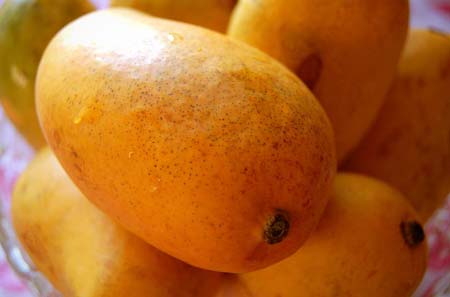Agri University to conduct research on effects of global warming on Kesar keri
March 02, 2016

Junagarh
There is good as well as bad news for the Kesar Keri lovers of Gujarat and other parts of the country.
Several orchards of world famous ‘Kesar Keri’ (Mango) in Saurshtra region of Gujarat are seeing abnormal fruition patterns owing to global warming which has even caused early ripening and compelling the horticulture experts to do rigorous research.
In some strange and alarming cases some of the Kesar keri orchards are witnessing flowering (maur), growth of small unripe as well as fully grown ripe mangoes in one single tree at the same time.
Head of the Horticulture Department of Junagarh Agriculture University Professor (Dr.) R S Chovatia today said that the department of climate change which has undertaken several crop studies will also take up these abnormality.
‘In fact the abnormality is more or less visible for the past five to six years. This year several orchards in Talala of Gir-Somnath district and other places are witnessing it. It is certainly caused by climate change and is alarming,’ he said.
Dr. Chovatia said that normally Kesar mangoes ripe in Late April and Early May. Some of the cases of early fruition may be attributed to reasons like the particular tree not getting enough of it in the last season but all the cases are not normal.
Normal or abnormal, but the good news for the Keri lovers is that the phenomenon has made this wonderful fruit make a presence in select areas as early as one to one and a half month before normal schedule this time around.
The Secretary of Talala Marketing Yard, one of the main supply points of the Kesar Keri, J D Thesia said that they have even received the first lot of the mangoes which is one to one and a half month ahead of normal schedule.
‘Though the mangoes are early and quite costly but they seem to be as pulpy and juicy as the normal ones. It is quite strange,’ he said.
– DeshGujarat
Related Stories
Untimely summer not entirely a bad news, rising mercury brings down prices of Kesar mango
Famous Kesar mango makes first presence in Junagadh marketing yard much ahead of season
Former MLA Govindbhai Parmar is BJP candidate for Talala assembly seat
Recent Stories
- Experts from Kochi visit Surat for feasibility survey of water metro along the Tapi
- PM-Kisan beneficiaries in Gujarat shall register on AgriStack Farmer Registry by Nov 25
- News in Brief from across Gujarat
- Update on work in progress on Dahod-Gujarat-MP Border section of Delhi-Mumbai Expressway
- IAS officer Mona Khandhar appointed as Chairman of Gujarat Panchayat Service Selection Board
- It is a kind of moral science lesson: Gujarat HC on plea against Bhagavad Gita teaching in schools
- RBI imposes monetary penalty on 4 cooperative banks in Gujarat
